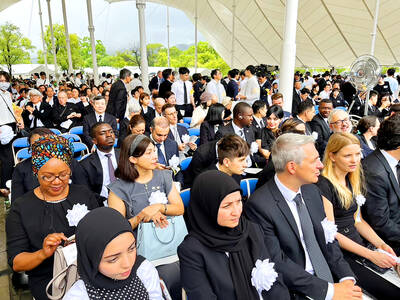The Asian Development Bank yesterday cut its growth forecast next year for the region’s developing economies to 7.6 percent, citing tighter credit and soaring food and energy costs.
The bank trimmed its previous growth forecast from April of 7.8 percent, and said actual growth could be lower if either inflation or the US economic slowdown were worse than expected.
It maintained its growth forecast this year for the region at 7.6 percent, with China set to dip below five years of double-digit growth to 9.9 percent this year and 9.7 percent next year.
However, it sharply raised its inflation forecast for East Asia to 6.3 percent this year, from 5.1 percent in its April outlook. Inflation averaged 3.9 percent in East Asia last year. Vietnam would be the worst off with 19.4 percent inflation this year and 10.2 percent next year.
The bank urged a “more decisive tightening of monetary policies” to fight the scourge of inflation and prevent it eating away the fruits of speedy economic growth.
It said many governments were “behind the curve” on the issue and warned the inflation problem was deepening.
“The risk of inaction is rising, and the region’s monetary authorities need to formulate more forceful and preemptive policy responses,” the ADB said.
While economic growth in developing Asia in the first three months of the year was stronger than expected, it eased in the second quarter as slower growth in industrialized nations began to bite, the bank said.
Growth in the industrialized economies of Hong Kong, South Korea, Singapore and Taiwan would slow to 4.7 percent this year amid weaker demand for their exports, before recovering to 4.9 percent next year, the bank said.
Aggregate economic growth in the other large economies of the ASEAN should ease to 5.5 percent this year, with prospects in Indonesia, Malaysia and the Philippines moderating, it said.
The region’s developing nations should weather the storm “relatively well,” the ADB said, adding that central bankers were faced with a dilemma in trying to keep inflation in check without depressing the economy.
“Rapidly rising inflation threatens to dampen consumer spending and risks a wage-price spiral that could derail the region’s recent solid growth,” the bank said.

DEFENSE: The first set of three NASAMS that were previously purchased is expected to be delivered by the end of this year and deployed near the capital, sources said Taiwan plans to procure 28 more sets of M-142 High Mobility Artillery Rocket Systems (HIMARS), as well as nine additional sets of National Advanced Surface-to-Air Missile Systems (NASAMS), military sources said yesterday. Taiwan had previously purchased 29 HIMARS launchers from the US and received the first 11 last year. Once the planned purchases are completed and delivered, Taiwan would have 57 sets of HIMARS. The army has also increased the number of MGM-140 Army Tactical Missile Systems (ATACMS) purchased from 64 to 84, the sources added. Each HIMARS launch pod can carry six Guided Multiple Launch Rocket Systems, capable of

TRAJECTORY: The severe tropical storm is predicted to be closest to Taiwan on Wednesday and Thursday, and would influence the nation to varying degrees, a forecaster said The Central Weather Administration (CWA) yesterday said it would likely issue a sea warning for Tropical Storm Podul tomorrow morning and a land warning that evening at the earliest. CWA forecaster Lin Ting-yi (林定宜) said the severe tropical storm is predicted to be closest to Taiwan on Wednesday and Thursday. As of 2pm yesterday, the storm was moving west at 21kph and packing sustained winds of 108kph and gusts of up to 136.8kph, the CWA said. Lin said that the tropical storm was about 1,710km east of Oluanpi (鵝鑾鼻), Taiwan’s southernmost tip, with two possible trajectories over the next one

Tropical Storm Podul strengthened into a typhoon at 8pm yesterday, the Central Weather Administration (CWA) said, with a sea warning to be issued late last night or early this morning. As of 8pm, the typhoon was 1,020km east of Oluanpi (鵝鑾鼻), Taiwan’s southernmost tip, moving west at 23kph. The storm carried maximum sustained winds of 119kph and gusts reaching 155kph, the CWA said. Based on the tropical storm’s trajectory, a land warning could be issued any time from midday today, it added. CWA forecaster Chang Chun-yao (張竣堯) said Podul is a fast-moving storm that is forecast to bring its heaviest rainfall and strongest

CRITICISM: It is deeply regrettable that China, which is pursuing nuclear weapons, has suppressed Taiwan, which is pursuing peace, a government official said Representative to Japan Lee Yi-yang (李逸洋) yesterday accused Beijing of interference after Taiwan’s official delegation to the Nagasaki Peace Memorial Ceremony in Japan was assigned seating in the “international non-governmental organizations [NGO]” area. “Taiwan is by no means an international NGO, but a sovereign nation that is active on the international stage,” Lee said. Lee and Chen Ming-chun (陳銘俊), head of the Taipei Economic and Cultural Office (TECO) in Fukuoka, attended the ceremony in Nagasaki yesterday, which marked the 80th anniversary of the atomic bombing of the city. That followed Lee’s attendance at the Hiroshima Peace Memorial Ceremony on Wednesday